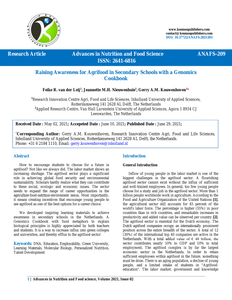Be energy future proof: - So, be energy future proof, you do now no how. - Include legislation in this but do not rely on legislation as a guide line. - Base your future-proof energy system on the trends and prepare for that. - But be aware: this ain’t easy.
DOCUMENT

How to encourage students to choose for a future in agrifood? Not like we always did. The labor market shows an increasing shortage. The agrifood sector plays a significant role in achieving global food security and environmental sustainability. Scholars hardly realize what they can contribute to these social, ecologic and economic issues. The sector needs to expand the range of career opportunities in the agriculture-food-nutrition-environment nexus. Most importantly, it means creating incentives that encourage young people to see agrifood as one of the best options for a career choice. We developed inspiring learning materials to achieve awareness in secondary schools in the Netherlands. A Genomics Cookbook with food metaphors to explain biological principles is highly appreciated by both teachers and students. It is a way to increase influx into green colleges and universities, and thereby efflux to the agrifood sector.
MULTIFILE

Global climate agreements call for action and an integrated perspective on mobility, energy and overall consumption. Municipalities in dense, urban areas are challenged with facilitating this transition with limited space and energy resources, and with future uncertainties. One important aspect of the transition is the adoption of electric vehicles, which includes the adequate design of charging infrastructure. Another important goal is a modal shift in transportation. This study investigated over 80 urban mobility policy measures that are in the policy roadmap of two of the largest municipalities of the Netherlands. This analysis consists of an inventory of policy measures, an evaluation of their environmental effects and conceptualizations of the policy objectives and conditions within the mobility transitions. The findings reveal that the two municipalities have similarities in means, there is still little anticipation of future technology and policy conditions could be further satisfied by introducing tailored measures for specific user groups.
DOCUMENT

Possibly, the aviation sector’s decarbonization challenge (see Dutch knowledge key in international climate study for tourism | CELTH) has profound implications for the ability of aviation-de-pendent outbound tour operators to attract capital and with that their ability to maintain or trans-form their current business portfolio (understood here as the current product offers and approximate carbon footprints, business models, and ownership structures present in this economic do-main). Knowledge about these (possible) investment risks and their business and policy implications is lacking. This project therefore addresses this knowledge gap by means of the following research questions.1. What is the current business portfolio of Dutch outbound tour operators?a. To what extend do Dutch outbound tour operators depend on aviation in terms of product offer and turnover?b. What is the relative carbon footprint share of aviation-based products compared to the total outbound product offer and turnover of Dutch outbound tour operators?2. What are investment risks of this business portfolio as indicated by investors?a. How do investors evaluate investment risks in relation to climate change mitigation and de-carbonisation?b. What are investment risks of the business portfolio of Dutch outbound tour operators?c. What are the reflections on and implications of these investment risks from the perspective of policymakers and tour operators?